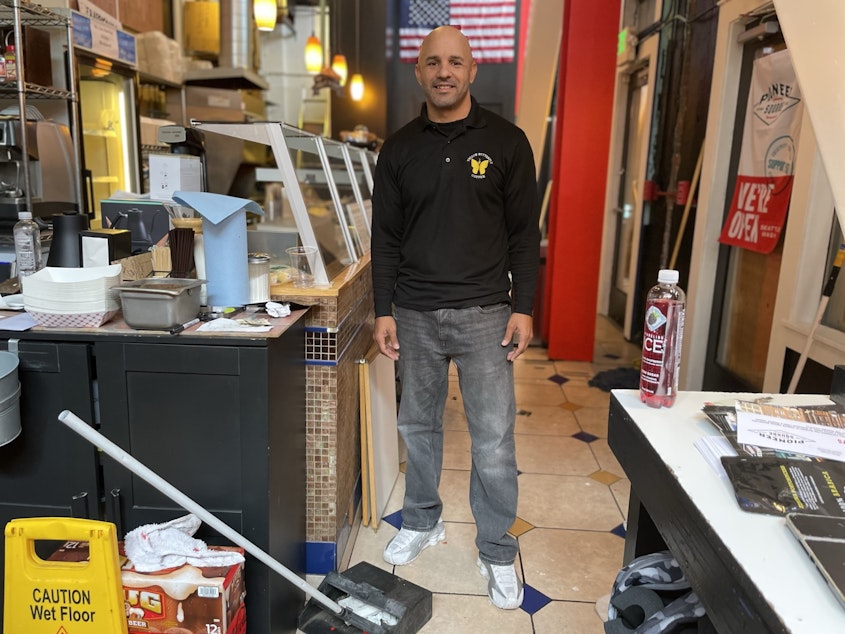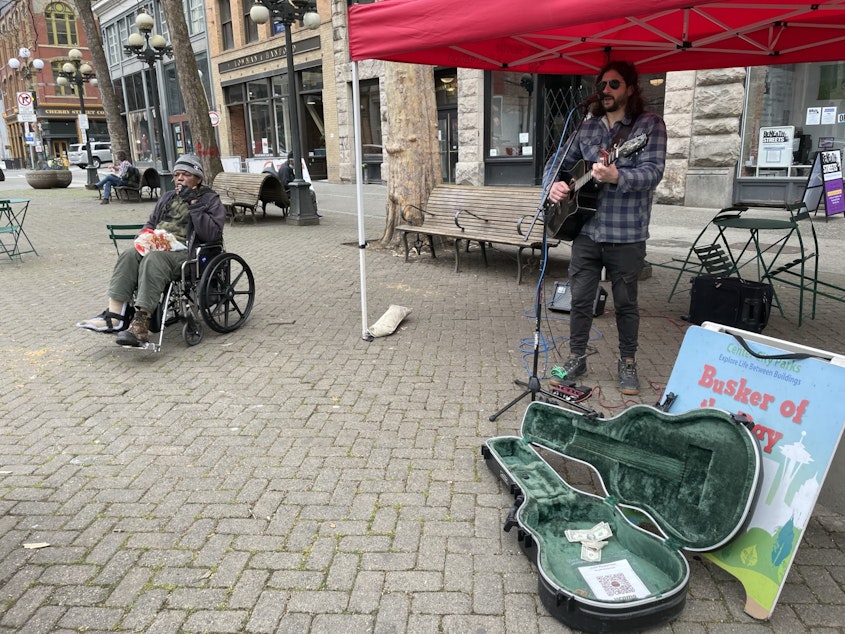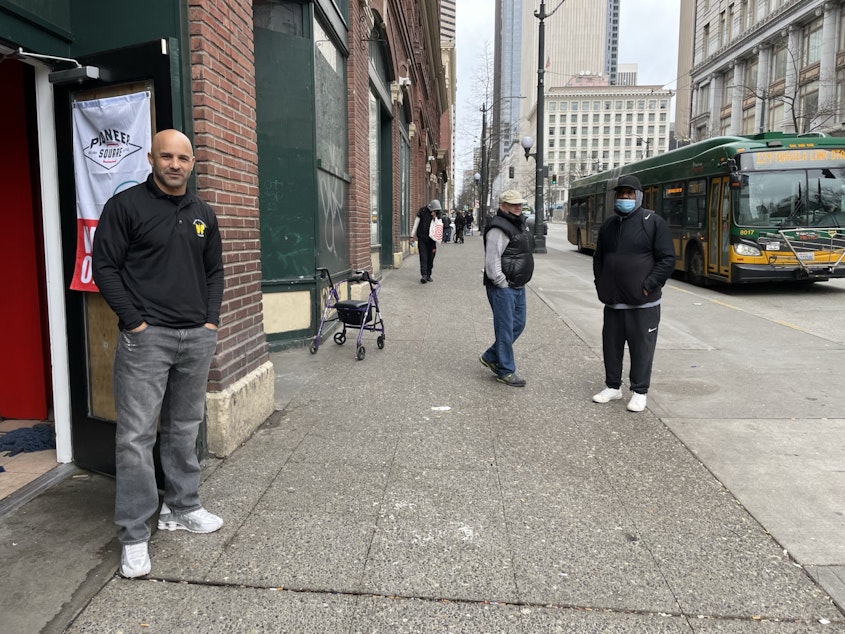Behind boarded up windows, Seattle coffee entrepreneur dreams big

With many office workers still remote, downtown Seattle businesses have struggled. So it seems like a risky time to open a new business.
But one new business owner has some unique tricks up his sleeve: Puerto Rican coffee, chocolate, and a dancing panda.
It’s a weekday afternoon, and musician Judd Wasserman is busking in Pioneer Square Park. He’s being paid by the city's parks department for the gig. It’s part of a plan to make downtown’s public spaces more welcoming.
Today, his audience is a couple of guys who live in a nearby homeless shelter. Wasserman says he's happy to have an audience.
"Doesn’t matter, everyone loves music, whether you’re homeless and have nothing or you’re a tourist from another city."

A lot of people in downtown Seattle say they’re tired. Tired of the pandemic. They’re tired of the crime.
Sponsored
People who live on the streets are tired, too. They’re tired of the services they rely on being unavailable or closed. They’re tired of being blamed for problems.
"All of a sudden, everything is coming a little bit back to life," said Aaron Guyton who lives in a downtown shelter. "But look at how many businesses have closed. I mean, you still got boarded up businesses around here…"
But behind boarded up windows, many businesses are preparing for a new day. At 501 3rd Avenue, Robert Rodriguez is putting a fresh coat of paint on the coffee shop he bought, which he’s renaming Yellow Butterfly Coffee. The owners were selling their business and its equipment on the internet.
Rodriguez flew out from Puerto Rico to visit the site. The day he visited, the city was clearing out the homeless encampment at City Hall Park, across the street.
"So I saw that as a good sign," he says. "I said ‘Seattle is really working. They really want Seattle back to what it was.’"
Sponsored
Full of optimism, he spoke to his mom, who lives in Seattle.
"She was worried a little bit, like ‘Son, you know, you’re by yourself – and it’s a lot of work.’ And I was like ‘Mom, I did it in Puerto Rico, and I can do it here too.’"
It looked like a good deal, too. He'd talked the owners down from $85,000 to $40,000 for the business. His landlord, the Downtown Emergency Service Center (a homeless shelter), waived his $5,000 deposit, offered to pay for his water and power (within reason), and reduced his rent to $500 a month.

But Rodriguez discovered that there would still be challenges. After he bought the place, he realized there were a lot of people who hang out in his doorway doing drugs.
Sponsored
"Every time I come in and out, I have to ask for permission to come in through my door," he says, because people have taken shelter in his recessed entryway. "So I have to ask them politely, 'Can I get into my establishment?' Because they don’t know me.”
Rodriquez is not bitter about this. He’s empathetic. His first customers in Puerto Rico were refugees from hurricane Maria, which devastated the island in 2017. People who had nothing. It was in those refugee camps that he learned how coffee can bring people together.
He made connections with farmers who grew beans at the highest elevations on the island, where he says the best beans come from. Later, he opened a coffee stand in the city of Yauco.
He says his shop was in a rough neighborhood. So he developed a novel strategy to attract visitors: He started dressing up as a panda.
Sponsored
He bought a costume on the internet. It had a big round panda head. And when people came by, especially kids, if they knocked three times on a nearby door, he'd come out in the panda costume and start dancing.
"I made a lot of good friends, from 3 years old to 90 years old," he says. "They used to come and visit that place. I would just make them happy. That was my thing. And I loved it."
His coffee shop became a tourist destination, he says. Hotels would send busloads of people, just to see him. He used to get soaking wet, from the sweat, in that costume.
"And my mom was like, 'Are you dying inside? With the heat?' And I was like – 'Mom, I love it. Because I’m changing this area here and everyone is embracing what I’m doing.'"
Rodriguez's faith in the quality of his beans, his Puerto Rican chocolate (which he intends to make on site, in front of customers), and the value of sweat equity seem boundless. He says he hopes to grow his business into a chain and distribution platform, much like the Blue Bottle Coffee company, which sold for $700 million in 2017.
Sponsored
It’s unclear if a dancing panda hawking high-altitude Puerto Rican coffee will spark the kind of revitalization he hopes for on 3rd Avenue. But if parents bring their kids by, and knock three times on his door, he’s willing to give it a shot.
As some businesses are closing in downtown Seattle, new business owners are building out their own optimistic visions to bring new life to the area. Many of them believe, if the city can make people feel safe again, the streets will fill with workers and customers and sometimes, music.




